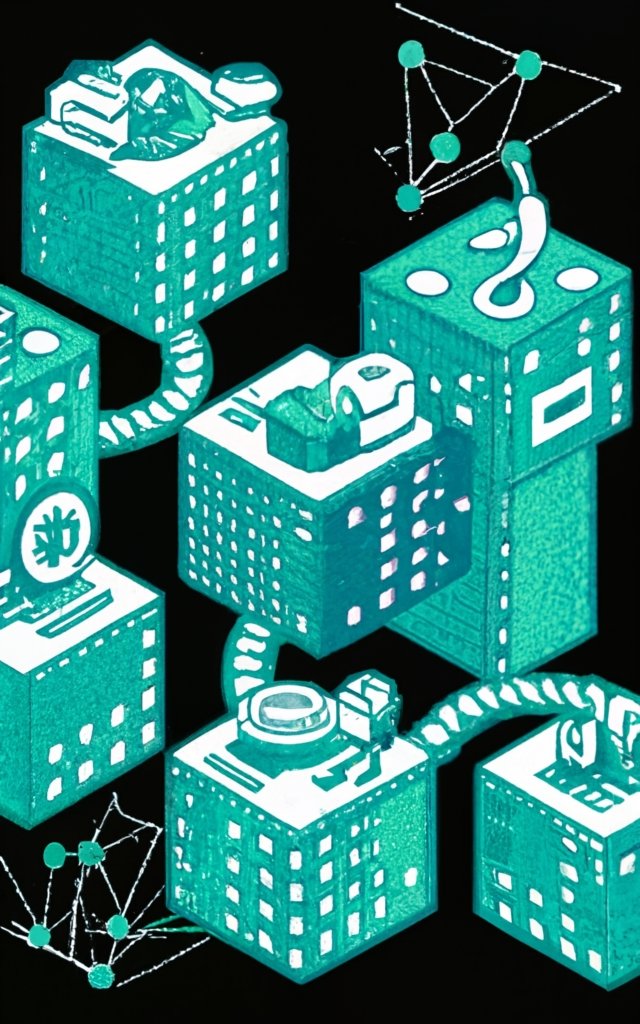Unseen Frontiers Where Blockchain is Changing the Game

In a technological landscape that evolves rapidly, blockchain technology is making significant inroads into sectors far beyond its financial origins. This year, the industry is on track for a compound annual growth rate (CAGR) of 56.3%. By 2030, experts predict the market could reach an astounding $469.49 billion. Dr. Lily Edwards, a leading authority in blockchain ethics, cautions that while the technology is promising, it demands rigorous ethical and societal scrutiny.
Challenging the Conventional Wisdom

Blockchain is often celebrated for its disruptive potential. It promises to revolutionize a variety of sectors, from finance to governance. “The real question isn’t whether blockchain will disrupt traditional industries; it’s what kind of disruption we’re willing to accept,” Dr. Edwards asserts.
However, an anonymous industry insider offers a counterpoint. “The idea that blockchain is a double-edged sword is overblown. The technology itself is neutral; it’s how we apply it that defines its ethical standing,” the source contends. This perspective raises an important question: Is it the technology that’s problematic, or is it our application and understanding that needs reevaluation?
The debate over blockchain’s ethical implications is far from settled. While some see it as a tool for financial inclusion, others argue that it could exacerbate existing inequalities. Dr. Edwards suggests that the technology’s disruptive potential should be used for societal good, not just financial gain.
Finally, it’s worth noting that blockchain is still a nascent technology, and its full impact remains to be seen. As it continues to evolve, so too will the ethical and societal questions it raises. Dr. Edwards calls for ongoing dialogue and research to ensure that the technology is developed and applied responsibly.
The Unspoken Costs in Ethical Dimensions
The promise of blockchain—transparency, security, and decentralization—often overshadows its ethical dimensions. One significant concern is its environmental footprint. Bitcoin, the most well-known application of blockchain, consumes as much energy as some small countries. “We’re so focused on what blockchain can do that we overlook what it should do,” warns Dr. Edwards.
Another ethical concern is the concentration of wealth within the blockchain ecosystem. A significant portion of blockchain funding is funneled into Web3 startups, raising questions about economic disparities. “This technology, initially aimed at democratizing finance, is becoming a haven for the financially elite,” observes Dr. Edwards.
Moreover, the ethical implications extend beyond environmental concerns and wealth concentration. Issues related to data privacy, regulatory oversight, and legal accountability are increasingly coming to the fore. Dr. Edwards argues that these ethical considerations should be integral to the development and application of blockchain technology.
The ethical dimensions of blockchain are complex and multifaceted. As the technology gains traction, it’s crucial to address these ethical considerations proactively. Dr. Edwards advocates for a balanced approach that weighs both the benefits and the costs.

Beyond the Financial Sphere

While blockchain has made its mark in the financial sector, its potential applications are far more wide-ranging. For instance, it could revolutionize healthcare by providing a secure and transparent method for managing medical records. “Blockchain has the potential to bring about societal change, not just financial disruption,” says Dr. Edwards.
The technology also has applications in governance and social justice. It could, for example, be used to create more transparent and accountable systems for public services. Dr. Edwards suggests that these less-publicized applications of blockchain could have a transformative impact on society.
However, these potential benefits are not without challenges. Issues related to scalability, interoperability, and public awareness must be addressed for these applications to gain widespread adoption. Dr. Edwards calls for multi-stakeholder collaborations to overcome these challenges and realize blockchain’s full potential.
While blockchain’s financial applications are well-documented, its potential to drive societal change is underexplored. Dr. Edwards argues that realizing this potential will require concerted efforts from industry, government, and civil society.
A Call for Nuanced Understanding
As we approach a decade that could be dominated by blockchain, it’s essential to look beyond market projections and venture capital interest. “Blockchain is at a crossroads. It can either widen the gap between the haves and the have-nots, or it can democratize access to resources and opportunities. The choice is ours,” concludes Dr. Edwards.
The technology is not just about creating new kinds of assets or more efficient transaction methods. It’s about the kind of future we’re building. As we navigate this complex landscape, we must scrutinize who benefits from these innovations, question their ethical implications, and explore blockchain’s untapped potential for societal impact.
The choices we make today will shape the blockchain landscape of tomorrow. Dr. Edwards urges policymakers, industry leaders, and the public to engage in a nuanced dialogue about the technology’s ethical and societal implications.
The blockchain narrative is far more complex than market projections suggest. As we move forward, it’s crucial to engage in a balanced discourse that considers both the technology’s potential benefits and its ethical costs. Dr. Edwards’ final observation serves as a poignant reminder: “The future of blockchain isn’t predetermined; it’s a future we have a hand in shaping.”



